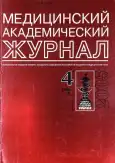Sepsis is a main complication of the late period of posttraumatic disease
- Authors: Bagnenko S.F.1, Shapot Y.B.1, Lapshin V.N.1, Shach B.N.1, Gromov M.I.1, Pivovarova L.P.1
-
Affiliations:
- St. Petersburg Djanelidze Research Institute of Emergency Medicine
- Issue: Vol 5, No 4 (2005)
- Pages: 60-64
- Section: Clinical medicine
- Published: 30.11.2005
- URL: https://journals.eco-vector.com/MAJ/article/view/693790
- ID: 693790
Cite item
Abstract
In the sharp period of posttraumatic disease (period of shock) systemic hypoperfusion caused to ishemia and damage of target-organs (organs with high level of methabolism): intestinum, marrow, hepar, kidneys.
In the early period of posttraumatic disease reperfusion damages of this organs is manifest syndrome of systemic inflammatory response (SIRS). Damages of mucous tissue on intestinum lead to translocation endogeneous bacteria in blood.
The feature of late period of posttraumatic disease is the presence of dead tissues, bacteremia and depression of immune defense. All this create the conditions on transformation aseptic SIRS to sepsis
Keywords
About the authors
S. F. Bagnenko
St. Petersburg Djanelidze Research Institute of Emergency Medicine
Author for correspondence.
Email: shabanov@mail.rcom.ru
Член-корреспондент РАМН
Russian Federation, St. PetersburgYu. B. Shapot
St. Petersburg Djanelidze Research Institute of Emergency Medicine
Email: shabanov@mail.rcom.ru
Russian Federation, St. Petersburg
V. N. Lapshin
St. Petersburg Djanelidze Research Institute of Emergency Medicine
Email: shabanov@mail.rcom.ru
Russian Federation, St. Petersburg
B. N. Shach
St. Petersburg Djanelidze Research Institute of Emergency Medicine
Email: shabanov@mail.rcom.ru
Russian Federation, St. Petersburg
M. I. Gromov
St. Petersburg Djanelidze Research Institute of Emergency Medicine
Email: shabanov@mail.rcom.ru
Russian Federation, St. Petersburg
L. P. Pivovarova
St. Petersburg Djanelidze Research Institute of Emergency Medicine
Email: shabanov@mail.rcom.ru
Russian Federation, St. Petersburg
References
- Гринев М. В., Громов М. И., Комраков В. Е. Хирургический сепсис. М.-СПб., 2001. 237 с.
- Долгушин И. И., Зурочка А. В., Марачев С. И. Острая эндогенная бактериемия и механизмы ее развития при стресс-реакции // Патол. физиол. и эксперим. терапия. 1985. № 2. C. 89-90.
- Ерюхин И. А., Гельфанд Б. Р., Шляпников С. А. Хирургические инфекции: Руководство. СПб.: Питор, 2003. 853 с.
- Bone R. C., Balk R. A., Cerra F. B. et al. American college of chest physician (Society of critical care medicine consensus / Conference: Definitions for sepsis and organ failure and guidelines for the use of innovative therapies in process // Clin. Chest Med. 1992. Vol. 20. № 6. P. 864-874.
- Koziol J. M. Occurence of bacteremia during and after hemorrhagic shock // J. Trauma. 1988. Vol. 28. № 1. Р. 10-12.
Supplementary files






